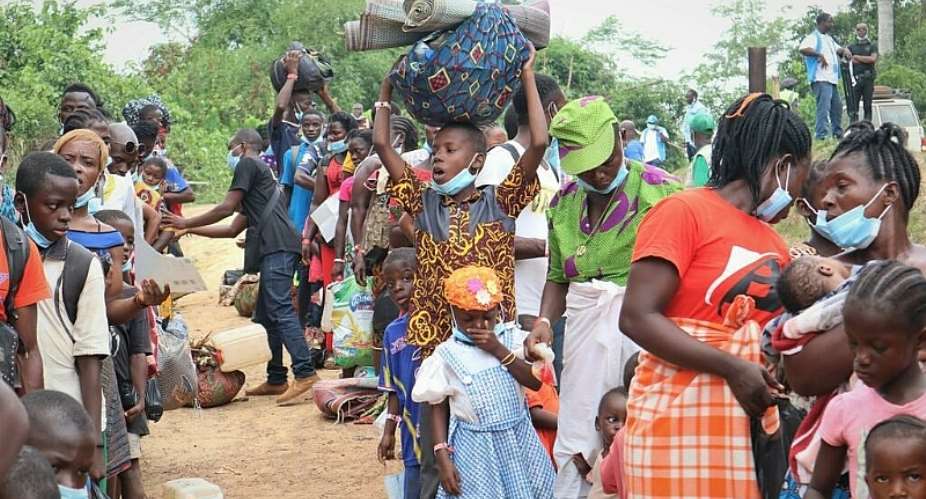Jealian Didier fled his native Côte d'Ivoire after fighting broke out nearly 20 years ago. The 46-year-old father of five is among some 200 refugees finally returning from northern Liberia, where they've lived since 2003. Others, however, prefer to remain in their adopted homeland.
“I feel relieved. I am happy to return with my children; nowhere is like home,” he told RFI at the Calava River – the body of water in Buutuo, north-eastern Liberia, that connects the country to Côte d'Ivoire.
Despite the joy, Didier feels sad that his wife, Aurie Souleymane, 42, is not coming with him. She misplaced the refugee identification card issued to her by UNHCR.
“My wife is staying back; I am taking the children along. Hopefully if things are normal in Côte d'Ivoire, I will try to come back and take her along," he adds.
The Ivorian refugees came over in two waves, during two crises. During the first civil war (2003-2007), Côte d'Ivoire was effectively split in two – with the government in charge of the north, and the rebels holding the south.
During the second conflict (2010-2011), forces loyal to then-president Laurent Gbagbo fought the supporters of internationally recognised president-elect Alassane Ouattara, causing Ivorians to flee.
Most want to stay
Unlike Didier and the dozens of refugees happily returning, the majority are opting for local integration. Among them is 37-year-old Glaitae Sarr.
She was 26 when her fiancé was arrested and killed, along with her father. With no family in Côte d'Ivoire, Sarr says she has no intension of returning.
“If I go, how do I survive with my three children? I am enjoying peace here, although life is hard," she says tearfully.
Sarr has been a domestic worker since crossing over to Liberia in 2011.
“We brush cocoa and coffee on different farms. I get 500 Liberian dollars (three euros). When you're lucky to get a good farmer they give you additional money and rice, sometimes vegetables," Sarr says.
"That is how I feed the children as a single mother."
For Lia Depi Eugene, who has lived in Bahn refugee camp in Liberia's eastern Nimba County for many years, some preconditions must be met before he returns. He spoke to RFI through an interpreter.
Eugene wants the government to create a sustained livelihood program, employment opportunities and to give returning refugees a guaranteed monthly food ration.
He teaches chemistry and geography at Payee High School in Nimba, earning 2,000 Liberian dollars (12 euros) a month.
Eugene says the local community provided himself, his wife and their three children with farmland to enable him them to grow vegetables.
“The students come on the farm and help me with clearing and planting of the cassava, pepper and other crops. So I cannot leave something certain for something uncertain,” Eugene says.
Conflict fears
During a town hall meeting with UNHCR officials in Bahn, some of the refugees expressed fear of a possible reemergence of conflict in Côte d'Ivoire, saying they no longer trusted Ivorian politicians.
“Some of us have children by Liberian mothers; how do we leave the children behind?" asked Jean Pean, a camp leader in Bahn.
"If we decide to say, will the Liberian government give us farming lands? Will UNHCR give us a package?”
UNHCR Country Representative Roseline Okoro says some of the demands are unjustified.
“Resettlement countries – for one reason or another – are not interested in resettlement for Ivoirians because they believe they can all go back home,” Okoro told the refugees.
Meanwhile, UNHCR assistant secretary general for protection, Gillian Triggs, says a special package has been set aside for those returning.
- Liberian government condemns attack on Côte d'Ivoire military base
- Ivorian refugees flee to Liberia as Weah denounces Cote d'Ivoire post-election violence
While commanding the Liberian government to protect the refugees over the years, Triggs said UNHCR provided a return package to enable refugees to restart their lives.
“For those who decided to remain in Liberia, the government agreed to give them residency permits,” Triggs adds.
More than 29,000 refugees have been repatriated to Cote d'Ivoire since the end of the crisis, but the Liberian Refugee Repatriation Resettlement Commission said a lot more were still in Liberia.
For some Liberians, such as farmer Elizabeth Harris, the departure of the refugees could undermine their harvest.
“These people have been of great help to us; we hired them as contractors to cultivate our farms," Harris says.
"So if they leave how will a single mother like me continue farming?”





 We’ll no longer tolerate your empty, unwarranted attacks – TUC blasts Prof Adei
We’ll no longer tolerate your empty, unwarranted attacks – TUC blasts Prof Adei
 Bawumia donates GHc200,000 to support Madina fire victims
Bawumia donates GHc200,000 to support Madina fire victims
 IMF to disburse US$360million third tranche to Ghana without creditors MoU
IMF to disburse US$360million third tranche to Ghana without creditors MoU
 Truck owner share insights into train collision incident
Truck owner share insights into train collision incident
 Paramount chief of Bassare Traditional Area passes on
Paramount chief of Bassare Traditional Area passes on
 Two teachers in court over alleged illegal possession of BECE papers
Two teachers in court over alleged illegal possession of BECE papers
 Sunyani: Victim allegedly shot by traditional warriors appeals for justice
Sunyani: Victim allegedly shot by traditional warriors appeals for justice
 Mahama vows to scrap teacher licensure exams, review Free SHS policy
Mahama vows to scrap teacher licensure exams, review Free SHS policy
 Government will replace burnt Madina shops with a new three-story, 120-store fac...
Government will replace burnt Madina shops with a new three-story, 120-store fac...
